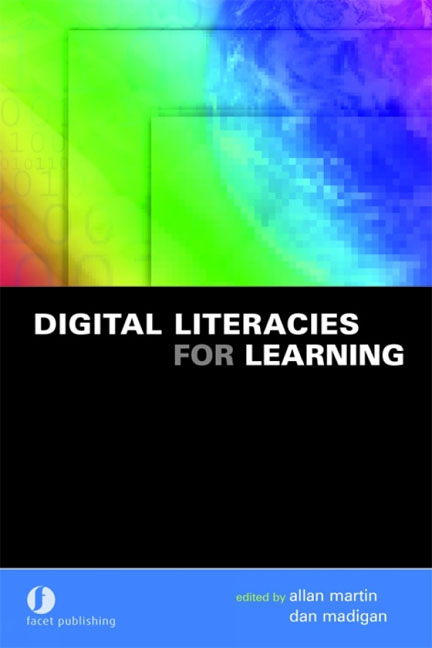Book contents
- Frontmatter
- Contents
- Dedication
- The contributors
- Foreword
- Preface
- Part I Literacies in the digital age
- Part II Enabling and supporting digital literacies
- 12 Supporting and enabling digital literacy in a global environment: preview of Part 2
- 13 A ‘dense symphony of the nation’: Cymru Ar-Lein and e-citizens and e-communities in Wales
- 14 The impact of information competencies on socio-economic development in Southern Hemisphere economies
- 15 Supporting students in e-learning
- 16 The information commons: a student-centred environment for IT and information literacy development
- 17 Socio-cultural approaches to literacy and subject knowledge development in learning management systems
- 18 Approaches to enabling digital literacies: successes and failures
- 19 Professional development and graduate students: approaches to technical and information competence
- 20 Windward in an asynchronous world: the Antiguan initiative, unanticipated pleasure of the distance learning revolution
- 21 A tale of two courses
- Index
17 - Socio-cultural approaches to literacy and subject knowledge development in learning management systems
from Part II - Enabling and supporting digital literacies
Published online by Cambridge University Press: 08 June 2018
- Frontmatter
- Contents
- Dedication
- The contributors
- Foreword
- Preface
- Part I Literacies in the digital age
- Part II Enabling and supporting digital literacies
- 12 Supporting and enabling digital literacy in a global environment: preview of Part 2
- 13 A ‘dense symphony of the nation’: Cymru Ar-Lein and e-citizens and e-communities in Wales
- 14 The impact of information competencies on socio-economic development in Southern Hemisphere economies
- 15 Supporting students in e-learning
- 16 The information commons: a student-centred environment for IT and information literacy development
- 17 Socio-cultural approaches to literacy and subject knowledge development in learning management systems
- 18 Approaches to enabling digital literacies: successes and failures
- 19 Professional development and graduate students: approaches to technical and information competence
- 20 Windward in an asynchronous world: the Antiguan initiative, unanticipated pleasure of the distance learning revolution
- 21 A tale of two courses
- Index
Summary
Abstract
Literacy development is increasingly mediated in digital, online environments such as learning management systems (LMS). These systems have been criticized for their lack of social presence, thereby reducing their impact for literacy and subject content learning. This chapter examines the definitions and descriptions of LMS and their characteristics. It then describes a blended model of on-campus and online delivery of courses in Australia and Singapore and examines some issues concerning advantages and disadvantages of LMS, with particular reference to enhancing the social elements or ‘social presence’ embedded in the system. Student feedback, survey data and a literature review inform an examination of issues such as ease of access, equity and the critical notion of ‘social presence’ in online spaces. Feedback was collected from public postings on a discussion board, online surveys, e-mail communications and paper-based surveys. This involved 495 students across three subjects in an Australian teacher pre-service preparation undergraduate course and one subject from a Singapore-based Master of Education subject.
Introduction
In the past, online learning environments have been characterized by a wide variety of features depending on the operating system, software tools and experience of the creator. Often, in educational contexts the knowledge of effective pedagogy has not been matched by equivalent knowledge of programming, web design or competency in using appropriate online tools. This sometimes created a tension between educators on one hand and technicians on the other, when the technical construction of online environments was outsourced or created in teams.
Learning management systems have developed as a means to cater for the needs of educators who may not have a high level of knowledge, or the time to construct their own custom-made e-learning environment. These systems provide a standardized ‘shell’ that includes a set of tools commonly used in online courses. Terms and definitions attributed to these systems are still in a state of evolution and are sometimes confusing or contradictory.
Merely paying attention to technical competencies and efficiencies in some cases has led to barren and impersonal environments with few opportunities for students to develop literacy and subject knowledge in ways that take advantage of social and cultural shared understandings and engagement. Lankshear (2003, 183) emphasizes the ‘socio-cultural approach to literacy’ within ‘new literacies’ that he describes as ‘literacies associated with new communication and information technologies, or in more general terms, the digital apparatus’.
- Type
- Chapter
- Information
- Digital Literacies for Learning , pp. 182 - 195Publisher: FacetPrint publication year: 2006



